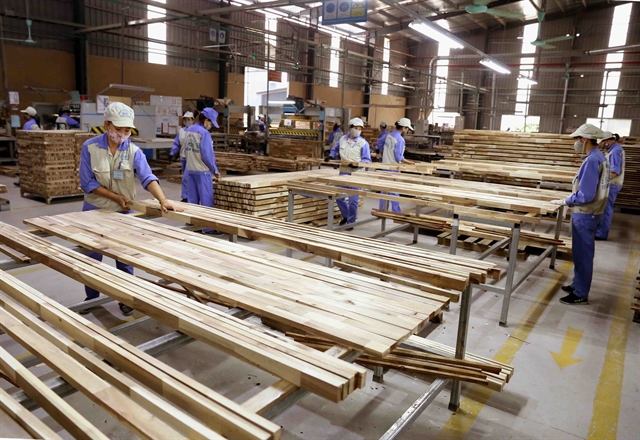The trade pact is expected to boost Viet Nam’s total gross domestic product (GDP) by 2.4 per cent and exports by 12 per cent by 2030 while helping reduce poverty for 100,000-800,000 Vietnamese people

National Assembly (NA) deputies officially ratified the Europe-Vietnam Free Trade Agreement (EVFTA) and the Europe-Vietnam Investment Protection Agreement (EVIPA) on Wednesday morning.
The EVFTA is expected to give Vietnamese companies better access to European markets, thus ensuring Viet Nam’s economic security.
The trade pact will erase import tax for Vietnamese products. In exchange, Viet Nam is expected to become more attractive to European investors.
The trade pact is expected to boost Viet Nam’s total gross domestic product (GDP) by 2.4 per cent and exports by 12 per cent by 2030 while helping reduce poverty for 100,000-800,000 Vietnamese people.
In the early stage, tariffs will fall to zero per cent for 71 per cent of Vietnamese exports then soon, all Vietnamese products will enjoy zero per cent when being shipped to Europe.
The EVIPA will help Viet Nam strengthen its important political and economic position in the Southeast Asia and Asia-Pacific regions, heightening the nation’s status in ASEAN and other international organisations.
The investment protection deal will encourage Viet Nam to keep working to complete its legal system and improve the investment and business environment for all investors.
The EVIPA will replace 21 bilateral investment protection agreements that Viet Nam has with European governments. The agreement contains four chapters, 92 articles and 13 appendices.
The ratification of the two deals will help tighten the bond between Viet Nam and the European Union in economic development, trade and investment.
Vietnamese consumers will be able to buy Europe-made products at high quality and at cheaper prices, Pier Giorgio Aliberti, Ambassador of the European Union to Viet Nam, said at a press conference yesterday.
“It will also be good for producers in Viet Nam because they will have better access to European markets with very high spending power,” he said.
The pacts will also be good for labour and environmental standards, which “are very crucial elements for the world of today and the world of tomorrow,” he said.
More benefits can be achieved, depending on how the agreements are implemented and how the Government is able to carry out its reforms, the ambassador said.
The two sides will have to establish a strong trade relationship, then European investors will come to Viet Nam, he added.
“When they (European companies) see the trade grow, they may consider investment,” he said. “High-quality investment from Europe will be a game-changer for Viet Nam in terms of becoming fully part of the global value chain.”
“In the post-COVID-19 world, people all over the world have realised it is important not to focus on one country for production. It’s better to diversify.”
“Viet Nam has a lot of opportunities to benefit from the diversification. It’s easier for Viet Nam because it now has a privileged relationship with the European Union.”
In 2001-18, Viet Nam’s exports grew by an average of 16 per cent per year but the share between the EU and Viet Nam in the country’s global trade is becoming smaller, the ambassador noted.
“There is lots of potential for the two sides to do better.”
Resolution on arbitration
National Assembly deputies yesterday discussed a resolution to proceed with the arbitral decision to settle disputes between Viet Nam and the European Union under the Europe-Vietnam Investment Protection Agreement (EVIPA).
Minister of Planning and Investment Nguyen Chi Dung said there are now rules which allow Vietnamese companies and organisations to carry out decisions made by international arbitrators.
But there are no instructions to help them resolve problems and comply with the EVIPA, he said, adding the resolution is needed to help maximise the benefits for the Vietnamese side when dealing in a lawsuit against the European side.
The resolution will assure the agreement is only applied to those that are subject to the agreement and connect the Vietnamese regulations with international practices, the minister said.
According to Le Thi Nga, Chairwoman of the Committee for Justice, the resolution is needed because it shows Viet Nam’s willingness and determination to follow the bilateral agreement, thus encouraging European governments to soon ratify the EVIPA.
Deputy Truong Trong Nghia of HCM City said that dealing with disputes and arbitrators’ decisions may put the Viet Nam-EU economic relationship at risk if the disputes are not handled properly.
He recommended the Supreme People Court work with related agencies to study lawsuits that have been filed upon the New York Convention 1958 on recognition and enforcement of foreign arbitral awards.
All NA deputies agreed the resolution will come into effect once the EVIPA takes effect. Vice NA Chairman Uong Chu Luu also assigned the NA justice committee to work with the Ministry of Justice and professional agencies to study further improvement for the resolution. — VNS





